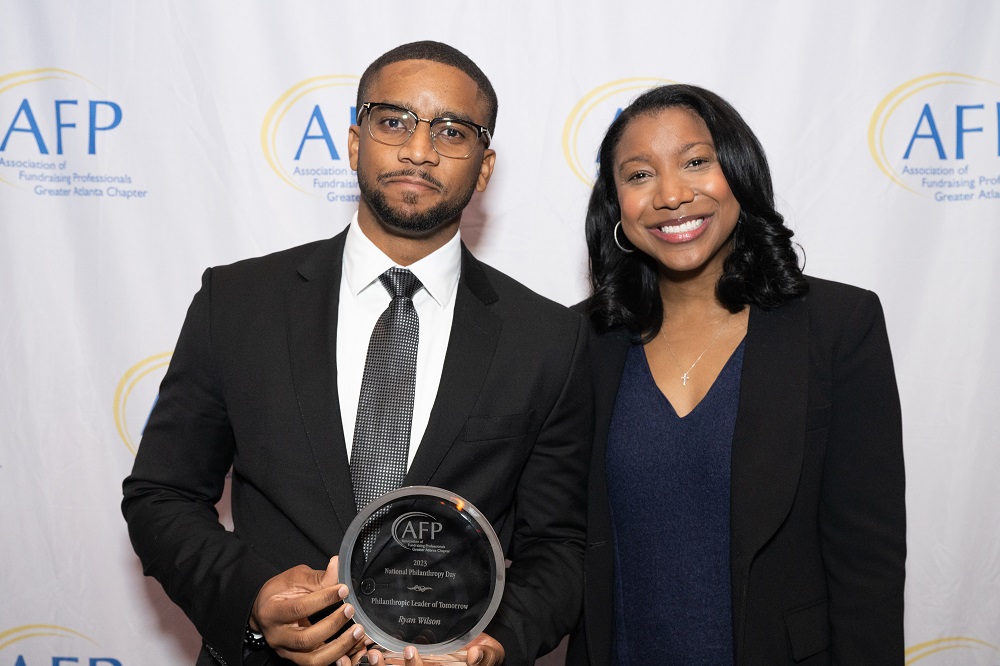Philanthropist Focus: RYAN WILSON
The Gathering Spot co-founder and CEO was honored on National Philanthropy Day and SocialAtlanta caught up with the entrepreneur to get his take on giving back.


The Gathering Spot co-founder and CEO Ryan Wilson was one of three local business leaders recognized and honored by The Association of Fundraising Professionals Atlanta chapter at The Georgia Aquarium for National Philanthropy Day. There, 800 local business, foundation, and non-profit leaders gathered for the event, amidst a backdrop of sharks, exotic fish and views of active marine life-with networking followed by a seated lunch where honorees were presented awards for their leadership and community service.
In 2022, The Gathering Spot – which Wilson grew to locations in Los Angeles and Washington DC – was acquired by Greenwood, Inc, a digital banking services platform for Black and minority individuals and businesses. The deal creating the largest fintech and community platform for Blacks and minorities with a combined community of over 1 million people. The companies share a mission of closing the wealth gap for minorities through community building, entrepreneurship, group economics and wealth building.
Wilson’s community involvement proves this is not only professional endeavor but a personal one as well, as he is active participant in several Atlanta civic and community organizations. He serves on the boards of Usher’s New Look, The Woodruff Arts Center, The Atlanta Business League, The Community Foundation for Greater Atlanta, Peace Preparatory Academy and The Atlanta Metro Chamber of Commerce. He is a member of the Atlanta Chapter of the 100 Black Men, Atlanta Rotary Club and has previously served as Co-Chair for Black Men Count Initiative of Fair Count. Wilson graduated from Georgetown University and Georgetown University Law Center.
At National Philanthropy Day, Wilson was honored with alongside Jerry Wilkinson, President of The Wilkinson Group, Inc., Tom Johnson, former CEO of CNN. Past honorees have included Bernie Marcus, Stephanie and Arthur Blank, and Michael C. Carlos.
SocialAtlanta, after the event, caught up with Wilson to get his take on the city’s needs for insuring it doesn’t outgrow its own citizens.
What inspires your philanthropy?
I grew up in Atlanta and professionally, I wanted to be an attorney because I figured it was the best way to advocate for issues I care about. But life takes you in different directions and here I am, an entrepreneur, and I do deeply care about the future of this city.
What do you consider to be your role?
I’m one of the folks who believes there’s a solution to the issues we are discussing on a regular basis. It takes people, it takes people going to work each day to make that a reality. I have a part to play, we as a business have grown significantly and that requires we do everything we can to engage with the issues of the day and the people of the day.
And what are the issues of the day?
From a high level, we income inequality. We have to make sure folks who live here can stay here. For a long time, folks weren’t coming here, that’s changed. As the city grows, the people should grow with it with regard to housing and education and more immediately, food insecurity. If you’re not nourished, it’s hard to talk about investing in education. We should be taking a systems approach to how we think about philanthropy.

Brett Graff is SocialMiami.com’s managing editor and has been a journalist covering money, people and power for over 20 years. Graff contributes to national media outlets including Reuters, Glamour, Harper’s Bazaar, Maxim, and the PBS show, Nightly Business Report. A former U.S. government economist, her nationally syndicated column The Home Economist is first published in The Miami Herald and then on the Tribune Content Agency, where it’s available to over 400 publications nationwide. She is broadcast weekly on two iHeartRadio news shows and is the author of “Not Buying It: Stop Overspending & Start Raising Happier, Healthier, More Successful Kids,” a parenting guide for people who might be tempted to buy their children the very obstacles they’re trying to avoid.


